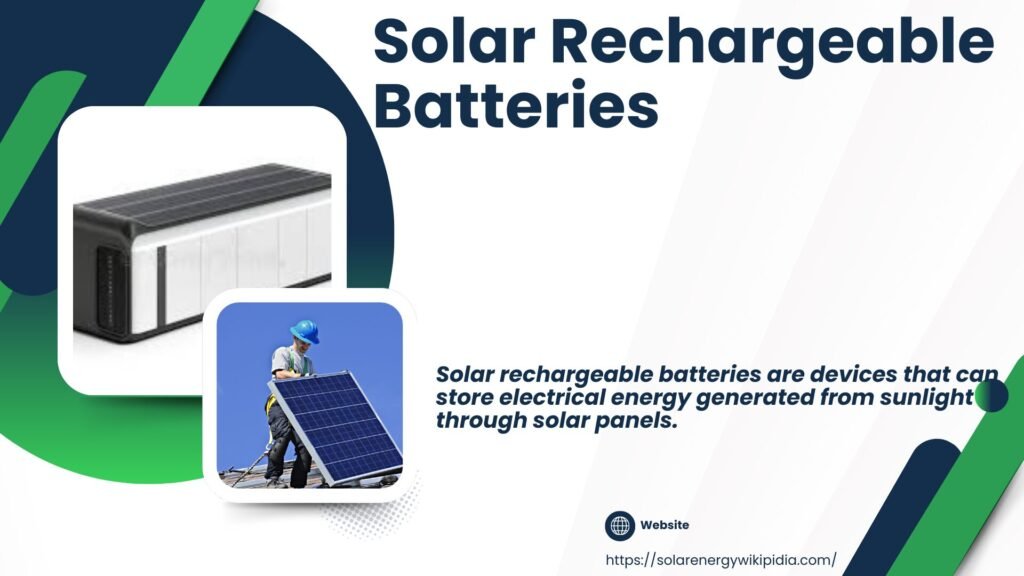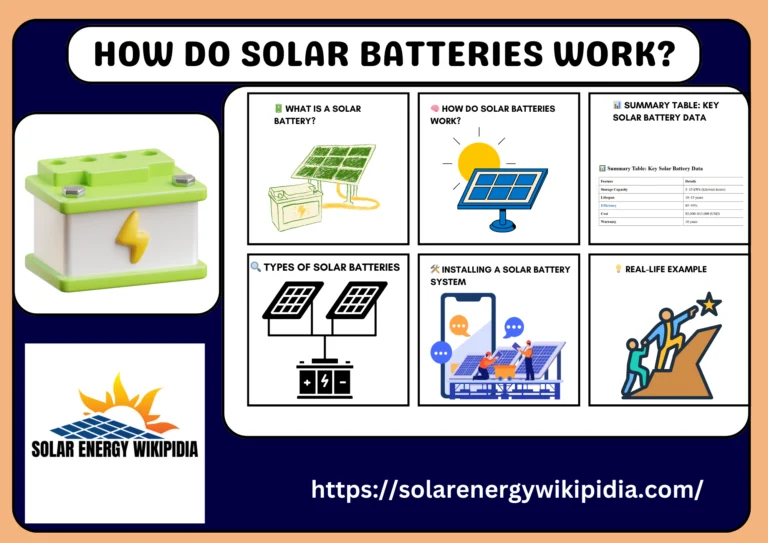
Solar rechargeable batteries are devices that can store electrical energy generated from sunlight through solar panels. These innovative batteries combine solar charging technology with rechargeable battery systems, allowing them to capture and store solar energy for later use in various applications, from small electronic devices to larger power storage systems.
Table of Contents
What Are Solar Rechargeable Batteries?
Solar rechargeable batteries are clever devices that can capture and store energy from the sun. They work together with solar panels to collect sunlight and turn it into electricity you can use later.
This makes them very useful for powering homes, devices, and other equipment, especially in places where regular electricity might not be available.
How do Solar Rechargeable Batteries Work?
Solar rechargeable batteries work through a process called the photovoltaic effect. When sunlight hits the solar panels, they convert this light energy into electrical energy, which then flows into the battery for storage.
The stored energy can be used anytime, even when the sun is not shining, making these batteries a reliable source of power for various devices and systems.
Types of Solar Rechargeable Batteries
- Lithium-ion Solar Batteries
Lithium-ion solar batteries are the most popular choice for solar energy storage today. They combine advanced technology with efficient performance, making them ideal for both home solar systems and portable devices. Their ability to store large amounts of energy in a compact size, along with their long lifespan of 10-15 years, makes them a smart investment despite their higher initial cost.
- Lead-acid Solar Batteries
Lead-acid solar batteries have been a trusted choice for solar energy storage since the early days of solar power. While they are heavier and bulkier than newer battery types, they remain popular for basic solar systems because of their reliability and lower cost, making them a practical choice for people who want to start using solar power without spending too much money upfront.
- Nickel-based Solar Batteries
Nickel-based solar batteries, such as nickel-cadmium (NiCd) and nickel-metal hydride (NiMH), offer a middle ground between lead-acid and lithium-ion options. These batteries are known for their durability and ability to perform well in harsh weather conditions, though they are not as common in modern solar installations due to their lower energy density and potential environmental concerns with disposal.
- Flow Batteries
Flow batteries represent an innovative approach to solar energy storage that works differently from traditional batteries. Unlike standard batteries that store energy in solid materials, flow batteries use two liquid electrolytes that are pumped through a special chamber to create electricity, making them highly scalable for large energy storage needs and potentially lasting for decades with proper maintenance. Their unique design allows them to be charged and discharged simultaneously, making them particularly useful for grid-scale energy storage and large solar installations.
Cost Efficiency of Solar Rechargeable Batteries
In liquid electrolytes, flow batteries store energy. Nickel-based batteries are durable but slightly more expensive than other types. A lead-acid battery is the most affordable, but it has a short lifespan. Lithium-ion batteries offer the best performance despite their higher cost.
| Battery Type | Initial Cost | Lifespan | Efficiency | Maintenance Cost |
| Lithium-ion | High | 10-15 years | 95% | Low |
| Lead-acid | Low | 5-10 years | 85% | High |
| Nickel-based | Medium-High | 15 years | 80% | Medium |
| Flow Batteries | High | 20+ years | 75% | Low |
Benefits of Solar Rechargeable Batteries
Environmental Impact
Solar rechargeable batteries help reduce carbon emissions significantly. They use clean energy from the sun instead of fossil fuels. This helps protect our environment and reduces air pollution.
Cost Savings
Users save money on their monthly electricity bills. The initial investment pays off over time through reduced energy costs. Free solar energy makes these batteries cost-effective in the long run.
Energy Independence
Using solar batteries reduces your reliance on the grid. You can generate and store your electricity. This provides power security during outages or emergencies.
Low Maintenance
These batteries require minimal upkeep once installed. Regular checks twice a year are usually sufficient. Most systems have simple monitoring systems to track performance.
Durability
Quality solar batteries can last for many years with proper care. They work effectively in various weather conditions. Most manufacturers offer warranties of 5-10 years.
Versatility
Solar batteries can power various devices and appliances. They work well for both home and business applications. The stored energy can be used day or night.
Space Efficiency
Modern solar batteries are compact and do not need much space. They can be installed in garages or utility rooms. Some models can even be mounted on walls to save floor space.
Smart Technology Integration
These batteries can connect to smart home systems for better control. Users can monitor energy usage through mobile apps.
The technology helps optimize energy consumption patterns.
Conclusion
Solar rechargeable batteries represent a smart investment for those looking to embrace clean energy solutions. They combine environmental benefits with practical advantages like reduced electricity bills and energy independence. While the initial cost may be high, the long-term savings, minimal maintenance, and positive environmental impact make them increasingly popular.
As technology continues to improve and prices decrease, solar rechargeable batteries are becoming a more accessible option for homes and businesses. Their ability to provide reliable power while reducing carbon footprints makes them a key technology for a sustainable future.
FAQs: Solar Rechargeable Batteries in 2025
How long do solar rechargeable batteries last?
Most solar batteries last between 5-15 years, depending on the type and maintenance. Lithium-ion models typically have the longest lifespan.
Can solar batteries power my entire house?
Yes, with the right system size and capacity. Multiple batteries can be connected to meet your household’s energy needs.
Do solar batteries work on cloudy days?
Yes, they still work on cloudy days, though charging may be slower. The stored energy from sunny days ensures continuous power supply.
How much do solar rechargeable batteries cost?
Prices typically range from $5,000 to $15,000 for a home system, including installation. The exact cost depends on capacity and type.
Do I need special maintenance for solar batteries?
Most solar batteries need minimal maintenance – just regular monitoring and basic cleaning. Professional inspection once or twice a year is recommended.







